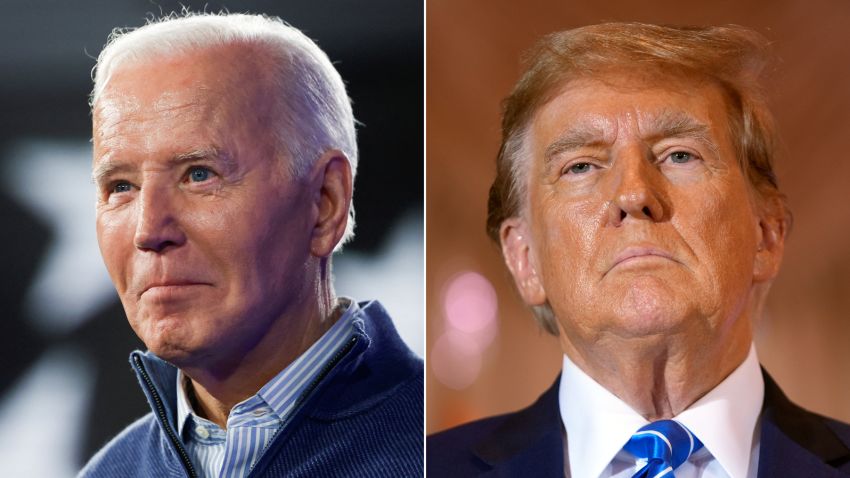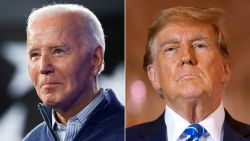Former President Donald Trump on Monday suggested he was open to making cuts to Social Security and Medicare after opposing touching the entitlement programs and attacking his GOP presidential primary rivals over the issue.
Trump was asked in an interview with CNBC whether he had changed his outlook on how to handle entitlement programs like Social Security, Medicare and Medicaid in order to tackle the national debt.
“There is a lot you can do in terms of entitlements, in terms of cutting and in terms of also the theft and the bad management of entitlements,” Trump said on CNBC’s “Squawk Box.”
He added: “There’s tremendous amounts of things and numbers of things you can do.”
Following the interview, President Joe Biden responded to a clip his campaign made of Trump’s comments: “Not on my watch.”
Trump campaign spokeswoman Karoline Leavitt later told CNN that Trump was “clearly talking about cutting waste, not entitlements.”
“President Trump delivered on his promise to protect Social Security and Medicare in his first term, and President Trump will continue to strongly protect Social Security and Medicare in his second term,” said Leavitt, who argued: “The only candidate who poses a threat to Social Security and Medicare is Joe Biden.”
“By unleashing American energy, slashing job-killing regulations, and adopting pro-growth America First tax and trade policies, President Trump will quickly rebuild the greatest economy in history and put Social Security and Medicare on a stronger footing for generations to come,” Leavitt said.
When Trump was president, his administration’s budget proposals included spending cuts to Social Security, primarily by targeting disability benefits, and Medicare, largely by reducing provider payments. Trump also signaled in an interview with CNBC in 2020 that he was open to cutting federal entitlements to reduce the federal deficit.
But Trump has vowed repeatedly on the campaign trail this election cycle to “always defend Medicare and Social Security,” and has a video posted to his campaign website in which he says, “Under no circumstances should Republicans vote to cut a single penny from Medicare or Social Security.”
“We don’t have to play around with Social Security and Medicare,” Trump said at a campaign rally in Michigan last month.
Trump also fiercely attacked former GOP rival Nikki Haley on the campaign trail over her support for reforming these entitlement programs. Haley called for increasing the age at which today’s younger workers would become eligible for Social Security retirement benefits and limiting the benefits of wealthier Americans. Trump also regularly took aim at Florida Gov. Ron DeSantis over his past support of privatizing Social Security and raising the retirement age – positions the governor distanced himself from during his failed presidential bid.
The Biden administration has sought to contrast the president’s support of Social Security and Medicare with Republicans’ proposals to address shortfalls in the programs’ finances. In his State of the Union address last week, Biden said he would stop anyone who tries to cut the programs or raise the retirement age.
Without any changes, Social Security’s combined trust funds are set to run dry in 2034, at which time the program’s continuing income from taxes will only be able to cover 80% of benefits owed, according the most recent Social Security trustees report.
Medicare’s hospital insurance trust fund, known as Medicare Part A, will only be able to pay scheduled benefits in full until 2031, according to the latest Medicare trustees’ annual report. At that time, Medicare, which covers nearly 67 million senior citizens and people with disabilities, will only be able to cover 89% of total scheduled benefits.
Two factors driving the projected rise in deficits are the aging population and the growth in federal health care costs, which will necessitate greater spending on Social Security and Medicare, according to the Congressional Budget Office.
Trump has been more open to cutting Medicaid enrollment and reducing federal funding for the program, which provides health coverage to low-income Americans. His administration approved requests from several states to require certain enrollees to work, which resulted in thousands of people losing coverage in Arkansas, the only state that implemented it for a short time before being stopped in federal court.
And as part of the 2017 efforts to repeal and replace the Affordable Care Act, Republicans wanted to curtail the amount of future federal support for Medicaid by sending a fixed amount of money to the states each year and reducing the growth rate of that funding. Additionally, they wanted to jettison the Obamacare program that expands Medicaid coverage to low-income adults.
Trump weighs in on TikTok
Also in the Monday interview with CNBC, Trump said it was a “tough decision” on whether the US should ban TikTok and argued getting rid of the app would benefit Facebook.
“The thing I don’t like is that without TikTok, you can make Facebook bigger, and I consider Facebook to be an enemy of the people along with a lot of the media,” Trump said, adding he thought “Facebook has been very bad for our country, especially when it comes to elections.”
Trump said he thought TikTok posed a national security threat to the US but said “you have that problem with Facebook and lots of other companies too,” and said, “there are a lot of people on TikTok that love it.”
“There’s, you know, a lot of good, and there’s a lot of bad with TikTok,” Trump said.
His comments come days after a House committee unanimously advanced a bill that could lead to a nationwide ban against TikTok on all electronic devices. The measure, which was approved by the House Energy and Commerce Committee, would prohibit TikTok from US app stores unless the social media platform is quickly spun off from its China-linked parent company, ByteDance. TikTok is one of the world’s most popular social media apps and is used by roughly 170 million Americans.
When Trump was president, he supported calls to ban the app, but has since appeared to have backed away from that stance. Trump was asked by CNBC about his change in position on TikTok and whether there was any connection to his recent meeting with Jeff Yass, a top GOP donor and major TikTok investor.
Trump said he did not discuss TikTok with Yass, and said he met with Yass and his wife for only “a few minutes,” and that Yass “never mentioned TikTok.”
Trump said when he was president, he wanted Congress to decide whether TikTok should be banned.
“I was at the point where I could have gotten it done if I wanted to,” Trump said. “I sort of said, you guys decide, you make that decision because it’s a tough decision to make.”
‘Tariffs are tremendously powerful’
Trump also said in the Monday interview that imposing tariffs “gives you power in dealing with other countries,” and said, “I’m a big believer in tariffs.”
“Tariffs are tremendously powerful in terms of stopping wars because they don’t want tariffs. And frankly, I can, I made them sing, I made other countries sing with the threat of tariffs. And if you don’t have tariffs, we have nothing whatsoever on them,” Trump said.
Trump said last month he would consider imposing a tariff upward of 60% on all Chinese imports if he regains the presidency.
As president, Trump imposed tariffs of 25% on $50 billion of Chinese goods in June 2018. Beijing countered with its own tariffs, and the spiral continued until the two countries arrived at an agreement in 2020. The Biden administration has largely kept the Trump-era tariffs in place.



















